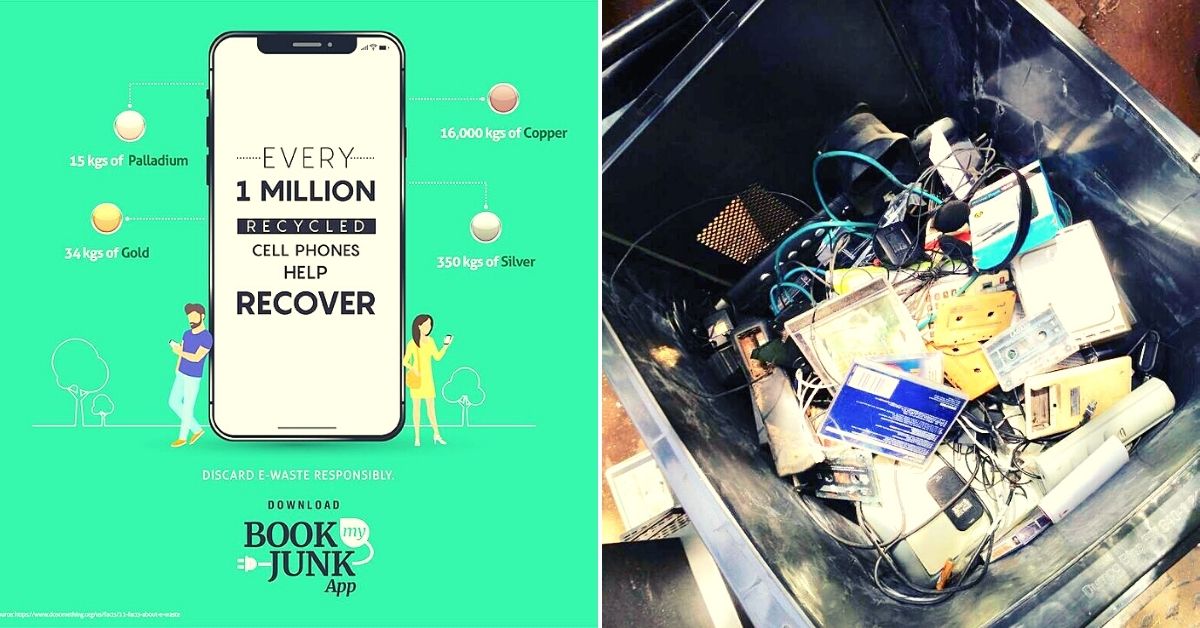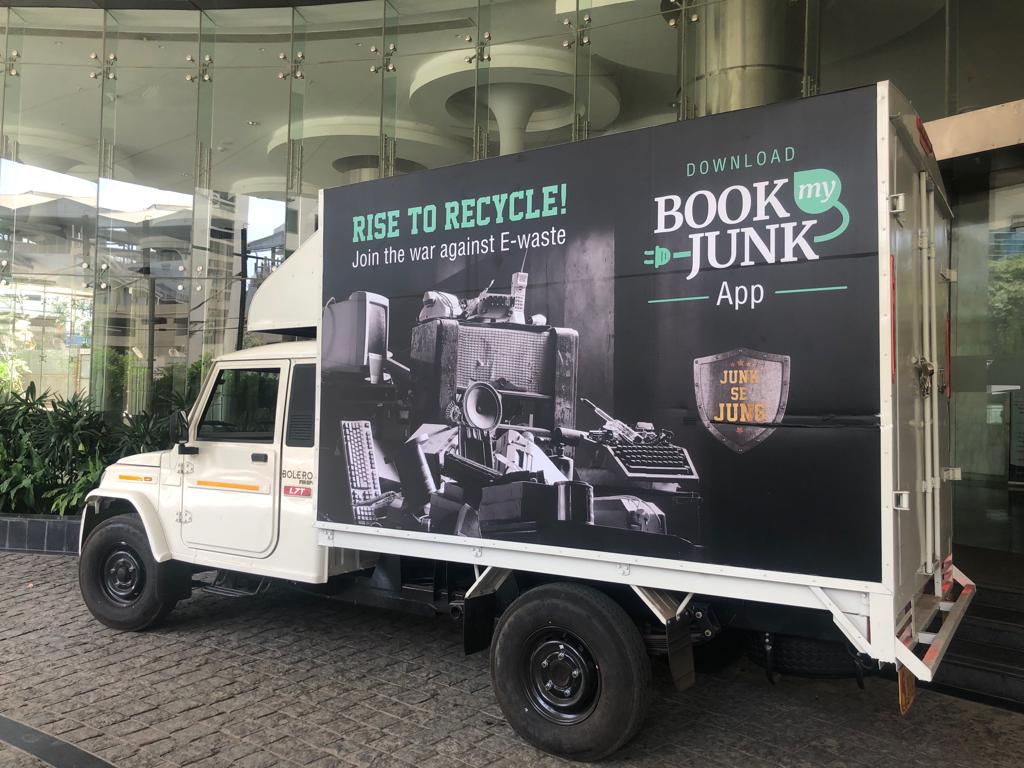Through its mobile application, Eco Recycling Ltd (Ecoreco), a Mumbai-based company, doesn’t pay users for their dead mobile phones or keyboard. It simply recycles e-waste through a system developed since 2005.
With an annual revenue of Rs 15 crore, the “first company to formally recycle e-waste in India” operates ISO-certified facilities and is currently listed on the Bombay Stock Exchange.
They provide end-to-end integrated solutions for e-waste management to multinational companies (MNCs), retailers, bulk consumers, original equipment manufacturers (OEMs), government agencies, non-profits, households and educational institutions, among other entities who discard high volumes of such items.
Free App For Your E-Waste
The team at Ecoreco spent the first year extensively testing their Book My Junk app, which was launched in early 2019.
“We collected e-waste from more than 800 homes and other locations during our test run. Unfortunately, once we established the app was working well, COVID-19 struck the world. In the lockdown period, we didn’t want to risk users or employees. Although the app was at a standstill for months, we are now back collecting e-waste again. Since the past month or so, we have been operational and Ecoreco has installed around 100 eco-bins for safe dumping of e-waste in various locations in Mumbai, Thane and other nearby places,” says BK Soni, chairman and managing director (CMD).
Soni is very clear on the point that the main objective of this app is not to collect large quantities of e-waste from individual users who want to make money. The app is only meant for those people looking to dispose of their e-waste in an environmentally-friendly manner.
“What a user can do is log into the app and submit basic details like their location address. We will send them a box by courier in which they can pack small electronic items like a mobile phone, laptop charger, laptops, cables, batteries or mouse that may not fetch them much value in the market. Once the packed box is kept ready, the user can notify us on the app. Our courier person then reaches the location and picks up the e-waste from their door. It’s completely effortless and a free of charge service which allows users to dispose of their e-waste in a manner that doesn’t harm the environment,” explains Soni.
The e-waste material gets completely dismantled at their facility in Mumbai, following which the recycling process commences. “Whatever profits we are making from our businesses, we want to spend a part of that on this social service, branding and awareness of responsible e-waste disposal, which we do through our app,” he adds.

Once the e-waste leaves a user’s home which consists of pieces that are absolutely non-reusable. These items are then shredded in their facility and segregation of plastic, glass, metals and hazardous substances takes place.
So, how does the company make money? Ecoreco works with MNCs or OEMs looking to recycle large volumes of e-waste.
“Hypothetically speaking, say an MNC wants to get rid of 2,000 laptops. Among the discarded 2,000 laptops we buy from a company at nominal value, there are at least 400 we can refurbish, market for reuse, and these items get sold out quickly. The remaining 1,600 pieces are completely shredded and segregated at our facility using the latest technology and protective gear for our workers. There are three kinds of materials we segregate in a laptop comprising different varieties of metals, plastic and glass, whose consolidated value is larger than the investment made by Ecoreco. This is how we make our margin,” says Soni.
The app, in turn, has received good reviews.
Siddhanth Valecha, a Mumbai based entrepreneur, calls Book My Junk a “fantastic application which works seamlessly”. The entrepreneur goes on to add how he would “100 per cent recommend this app for all people wanting to dispose of anything electronic from pencil cells and mobile phones to CDs and junk TVs.” Another user, meanwhile, talks about how she had an old TV which the local kabadiwala wasn’t willing to take. “After placing the request for a pickup, they collected the junk within two to three days, providing doorstep service for free,” she says.
Pioneers of the E-Waste Game
Before establishing Ecoreco, the 62-year-old Soni was a successful stock broker and financial consultant in Mumbai. It was a friend who first introduced Soni to e-waste management, and he was blown away by the future scope of this business. Establishing the company in 2005, he spent the first year extensively researching the sector by visiting e-waste recycling plants in Western Europe and the United States and talking to experts.
“In the beginning, our motivations were purely commercial because the consumption of electronic products was on the rise in India. Only when we started working in this segment, did we realise that our work could have a positive impact on the environment and our health. In 2005, we began with manual dismantling of electronic devices. This is an integral part of e-waste recycling, and workers have to don protective gear. In the following year, we installed our first shredder imported from Ireland in our small facility. In the early days, it was manual dismantling, mechanical shredding and different varieties of separators that remove different kinds of metals and hazardous products,” he recalls.

Soni also goes on to claim that Ecoreco was responsible for setting key milestones in the e-waste management sector long before the electronics industry and governments were ready for them. For example, they claim to have established the first producers responsibility organisation or PRO, which is defined here as “a professional organisation authorised or financed collectively or individually by producers, which can take the responsibility for collection and channelisation of e-waste generated from the ‘end-of-life’ of their products to ensure environmentally sound management of such e-waste”.
“We set up ‘WeeePRO’, providing innovative and flexible options to assist producers with meeting their Extended Producer Responsibilities (EPR). WeeePRO was introduced in 2011, even while the government was formulating regulation on the same. The first set of e-waste management rules in India came into existence on 1 May, 2012. We later changed the name of our PRO to PROEPR,” he notes.
Starting out as a bootstrapped entity, today, the company comprises three main investors. Soni has a 71 per cent stake, the Times of India Group holds 9 per cent and another 4 per cent belongs to the company supplying them the latest technology. The rest of 16 per cent is owned by 4,000 shareholders on the Bombay Stock Exchange (BSE). From its humble beginnings in 2005, today Ecoreco recycles 7,200 million tonnes per annum.
(Edited by Yoshita Rao)
No comments:
Post a Comment